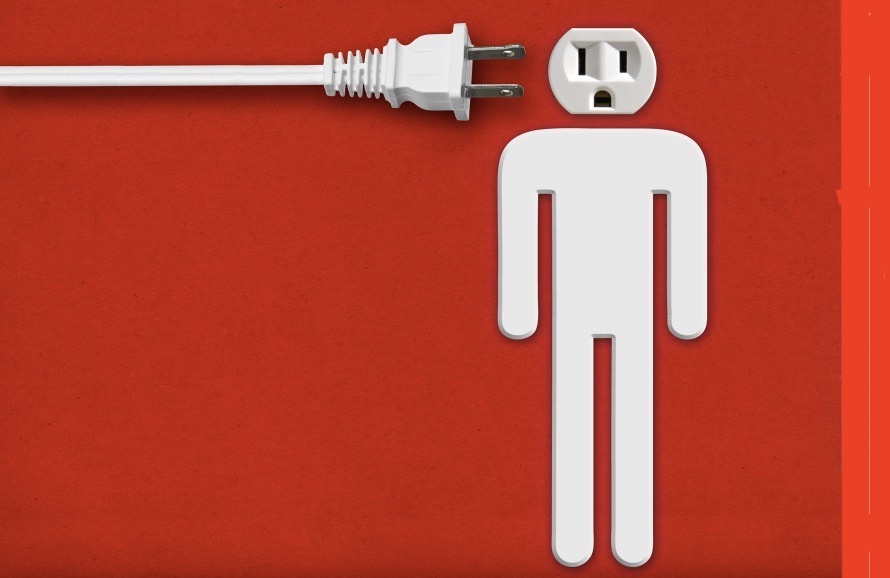What we put into our mind can be just as damaging as what we put into our bodies. Here’s how to practice sound media sobriety.

by Thérèse Jacobs-Stewart
I woke up with a start. There was a vague sense in my chest that something was off. Still dark outside, there was no warm body snuggled in the bed next to me. Instead, my husband, Jim, was planted on the couch in the living room with the light on, reading.
“What is it, Hon?”
“Can’t sleep.”
“How come? Are you sick?’
“No, just upset. While out in the car yesterday, I heard a radio show about the widening gap between the rich and the poor. I feel powerless to change what’s going on in our country, and that makes me angry!”
The predawn chat with Jim brought back memories of a conversation with Zen priest Steve Weintraub from the San Francisco Zen Center. I was telling him about feelings of depression and despair. Not unlike Jim, my discouragement arose from the politics of the time. A bit of a news junkie, I typically read several different newspapers along with my morning tea.

Weintraub talked about how his community consciously limits their news and media consumption. They’ve made a choice to “plug in” only once or twice a week.
“Of course, we know how important it is to stay informed on current issues,” Weintraub said. “It’s just that it’s equally important to guard one’s mind from becoming overwhelmed by hopelessness. Try cutting back how often you read the newspapers, maybe only once a week for a while, and see if it helps.”
It did.
A few months later, Jim and I gave away our TV. That was eight years ago now, and the result is a blessed quietude at home. We stay socially involved with the causes dear to us, but we’re not assaulted with frenzy or hype day in and day out. We’ve discovered that most important news events are live-streamed on the computer, and our friends are happy to have us stop by to watch the Grammys or the World Series.
Here’s how to practice sound media sobriety.
The Buddhists have five precepts that constitute a code of ethics for day-to-day living. The fifth precept reads, “to abstain from [drugs and alcohol] that cause intoxication and heedlessness.” However, modern day Zen master Thich Nhat Hahn expands the discussion to include our consumption of food, TV, media, electronic games and other activities that result in “clouding the mind.”
“Loneliness is one of the afflictions of modern life”
He says, “Loneliness is one of the afflictions of modern life. … When you are lonely, you open the refrigerator, watch TV, read magazines or novels or pick up the telephone to talk. But unmindful consumption always makes things worse. … If we are depressed, if we are in despair, it is because of something we have consumed. We should try not to consume things that nurture our anger, frustration and fear.”

Train in conscious consumption as a spiritual practice
Thich Nhat Hahn advises us to train in conscious consumption as a spiritual practice, something particularly fitting for those of us in recovery. In his book The World We Have, A Buddhist Approach to Peace and Ecology, he recommends holding the following intention:
“Am I determined not to gamble or to use alcohol, drugs or any other products which contain toxins, such as certain websites, electronic games, TV programs, films, magazines, books and conversations?”
“I will practice coming back to the present moment to be in touch with the refreshing, healing and nourishing elements in me and around me, not letting regrets and sorrow drag me back into the past nor letting anxieties, fear or craving pull me out of the present moment. I am determined not to try to cover up loneliness, anxiety or other suffering by losing myself in consumption.”
How can we practice mindfulness in what we eat, drink, read and watch? First, we need to pause. Stop seeking escape. Look into what is facing us. Then, consider what will preserve the well-being of ourselves, our families and the Earth.
Here are a few things to try:
- Speak less, listen more.
- Walk in silence. Hear the crunch of the ground under your feet. Feel the breeze on your face. Notice the color of the sky.
- Sit still for at least 20 minutes. Do nothing: Don’t answer the phone, read inspirational books, look at information about recovery or journal. Just observe your mind, watch your thoughts arise and let them pass on through.
- Leave the radio off in your car. Let your automobile become a bubble of quietness and peace.
- Spend less time online.
- Empty a room or designated space in your home, and keep it clutter-free.
- Get up early, and take in the moments before the world wakes up.
If we want to realize the transformation of recovery, we have to be awake to the present moment. This moment, where “all that is beautiful, all that is wonderful, all that is refreshing and healing” can be found.
It may even help us sleep at night.
Thérèse Jacobs-Stewart is the author of Mindfulness and the 12-Steps: Living Recovery in the Present Moment. She can be reached at www.mindroads.com.



No responses yet